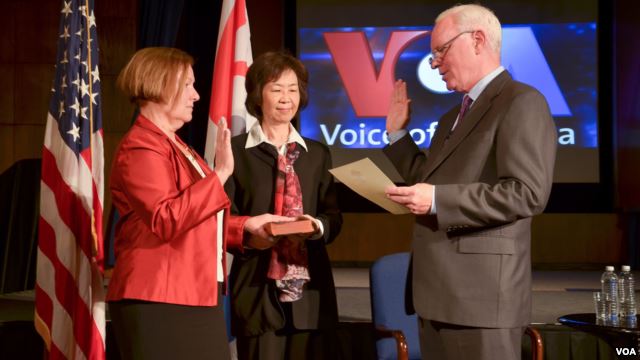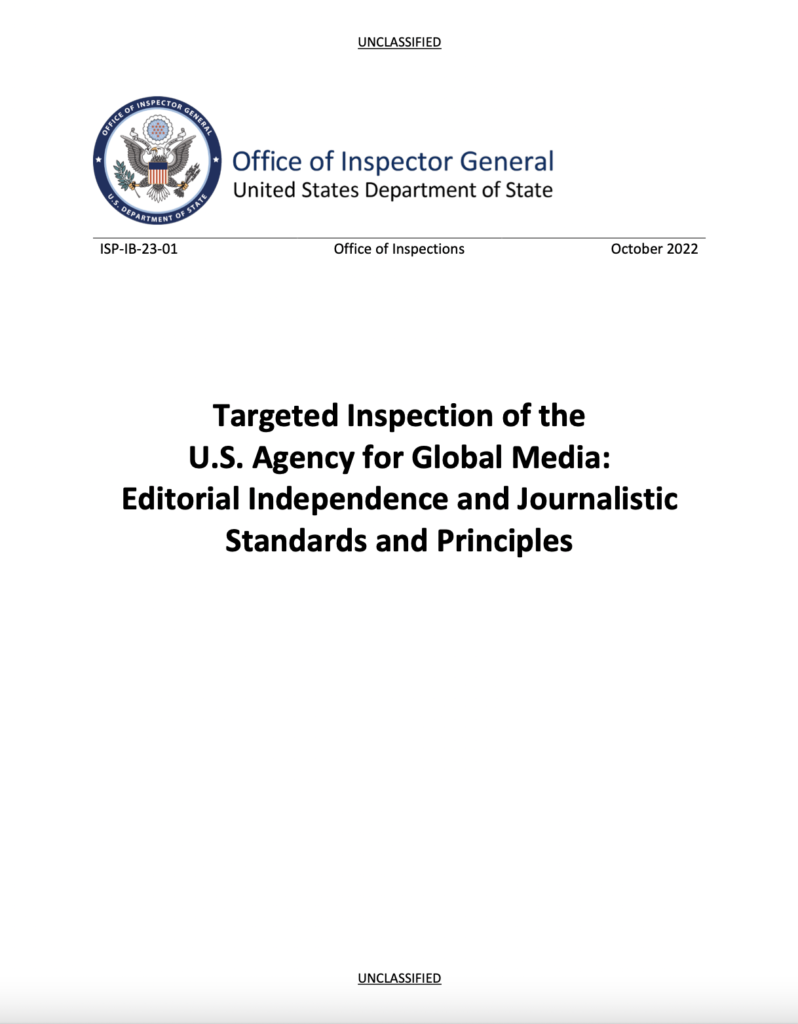Amanda Bennett, the current CEO of the U.S. Agency for Global Media (USAGM) and a former Voice of America (VOA) Director, and her top aide, Kelu Chao, who served earlier as acting USAGM CEO and spent years in senior managerial positions at VOA, ran a loose ship at the Voice of America on the establishment and enforcement of editorial standards and controls, according to the findings of an inspection report released by the Office of Inspector General (OIG).
USAGM Watch Commentary
Findings of the OIG inspection report show that under the watch of Amanda Bennett and Kelu Chao, the Voice of America lacked clearly defined editorial standards. Bennett served as the Director of the Voice of America from March 2016 to June 2020. The report, however, also blames Michael Pack, the former USAGM CEO under President Trump, for being too aggressive in addressing editorial control problems. The report points out that longtime VOA managers and some VOA reporters saw Pack’s actions as an attack on journalistic independence and the firewall separating the USAGM journalistic entities from the rest of the U.S. government. But reading between the lines, the OIG report also seems to imply that members of the current USAGM-VOA leadership team use the firewall to make themselves immune to oversight and accountability for their managerial and programming failures. The report indicates that having clearly written procedures on handling firewall violations and more rigorous program reviews could make VOA leaders and journalists more accountable and more professional.
In response to the OIG report’s findings, Kelu Chao said that she agrees with every OIG recommendation. Hence, the question is why she, Amanda Bennett and Bennett’s other top aides, Sandy Sugawara and current VOA Acting Director Yolanda López, did not address the editorial control problems while in charge of the Voice of America programs. When she became VOA Director in 2016, Bennett called Chao and other VOA managers her “fantastic leadership team.”
Furthermore, OIG found the networks generally had appropriate oversight of editorial controls, program reviews, and procedures to respond to violations of journalistic standards and principles, with exceptions at OCB and the Voice of America (VOA).
Targeted Inspection of the U.S. Agency for Global Media: Editorial Independence and Journalistic Standards and Principles
ISP-IB-23-01
October 2022
Despite a never before encountered high number of serious managerial and programming scandals while Amanda Bennett ran the Voice of America, and despite a promise of tough questions from Democratic Senator Robert Menendez at her initial confirmation hearing, the U.S. Senate confirmed her nomination on September 22, 2022 in a 60-36 vote to become the next USAGM CEO.
Unprecedented violations of the VOA Charter, such as the posting of a one-sided U.S. presidential election campaign ad with insults and even threats of physical violence against am American politician but lacking balance or context, would have almost certainly led to resignations or at least offers of resignations from senior agency and Voice of America leaders during VOA’s better years. Some of the illustrious journalists who had served as agency and VOA directors were Edward R. Murrow and John Chancellor.
Lately, managers responsible for allowing VOA Charter violations, as well as those who hired former Russian state media broadcasters with a history of anti-U.S. propaganda, avoided any severe repercussions. Some were later promoted to even more responsible positions. One former employee of Putin’s state media remained on VOA’s payroll as an on-air anchor contractor for many months after both Bennett and former BBG CEO John Lansing were informed that the journalist had previously produced anti-U.S. propaganda videos promoting conspiracy theories with anti-Semitic themes. One of Amanda Bennett’s highly-praised editors was reassigned after it was discovered that he had authored insulting social media posts on U.S. domestic politics. The agency’s authority to conduct security clearances for employees was revoked due to multiple violations and problems.
Senator Menendez ultimately voted in favor of Bennett’s nomination as the agency head after expressing concerns about her tenure as VOA director. Earlier, he strongly opposed Michael Pack’s USAGM nomination.
Senator Robert Menendez (D-NJ), Senate Foreign Relations Committee Chairman: Because there have been suggestions in the past that your previous role suggests that that is not the view that you had; that you were quote-unquote advocates for some of the views of these regimes. And I just want to set the record straight since not too many may attend the hearing, but when it comes time for a business meeting, we’ll hear a chorus of things from some people.
Amanda Bennett: I appreciate that. My entire journalistic career has been devoted to giving truthful news and information and not advocating for any position whatsoever, especially not that for repressive regime.
USAGM Watch will have more on the Office of Inspector General report after our volunteer journalists have a chance to read it. Here is the summary and the link to the full report, which is also posted on the OIG website.
Targeted Inspection of the U.S. Agency for Global Media: Editorial Independence and Journalistic Standards and Principles
ISP-IB-23-01 October 2020
At the request of the U.S. Congress,1 the Office of Inspector General (OIG) conducted a targeted inspection to assess how the U.S. Agency for Global Media (USAGM) and its five broadcasting entities2 (networks) complied with 22 Code of Federal Regulations (C.F.R.) Part 531, Statutory Firewall and Highest Standards of Professional Journalism. OIG also assessed whether USAGM and network staff followed internal policies and procedures intended to ensure adherence to the highest standards of professional journalism. OIG conducted an earlier targeted inspection, published in December 2020,3 that reviewed USAGM’s and the networks’ compliance with journalistic standards up to June 2020. This targeted inspection covers the period from June 2020 to November 2021.
For this report, OIG reviewed editorial independence and firewall language in USAGM governing legislation, regulations, and internal policies and procedures, as well as staff and stakeholder views of editorial independence and the adoption, repeal, and planned reissuance of 22 C.F.R. Part 531. OIG interviewed staff from USAGM and all five networks.
OIG also reviewed an October 2021 Government Accountability Office (GAO) report that focused on USAGM’s governance structure and oversight processes for its broadcasting entities4 and reviewed selected documents from firewall-related legal action that occurred during the former USAGM leadership’s tenure. Further, OIG noted that in June 2021, USAGM leadership hired independent experts to conduct a review of allegations referred to USAGM by the U.S. Office of Special Counsel (OSC)5 and other events at USAGM during the period from June 2020 to January 2021. Because these completed and ongoing reviews address the specific alleged violations of editorial independence by previous USAGM leadership, OIG did not attempt to reach conclusions on those specific allegations in this targeted inspection. Instead, OIG assessed the overall effectiveness of USAGM and network policies, procedures, leadership actions, and training in establishing organization-wide clarity and compliance with editorial independence and the firewall during the period covered by this inspection, including while 22 C.F.R. Part 531 was in effect.
GAO recommended in its report that Congress consider legislation to define the parameters of USAGM’s firewall, such as describing what is and is not permissible regarding network editorial independence.6 Moreover, in this review, OIG found that 22 C.F.R. Part 531 did not add sufficient clarity for USAGM and network staff to consistently define violations or ensure compliance during the short period of time the regulation was in effect. USAGM and network staff told OIG several actions by USAGM leadership during the period 22 C.F.R. Part 531 was in effect7 negatively impacted editorial independence and did not align with USAGM firewall principles. However, USAGM and network staff also said that unclear and inconsistent definitions of editorial independence and the firewall contributed to uncertainty about what constituted a firewall violation and to an uneven understanding at the working level about firewall protections, both in general and, in particular, when 22 C.F.R. Part 531 was in effect. OIG also found that USAGM’s internal procedures to address firewall issues and violations were outdated.
With respect to USAGM and the networks’ current adherence to the “highest standards of professional journalism,” OIG found that USAGM and network leadership communicated and modeled support for editorial independence and journalistic standards, although the Office of Cuba Broadcasting (OCB) could have more consistently communicated its priorities and objectives. Since February 2021, USAGM leadership had taken steps to improve oversight of internal controls governing journalistic standards, including issuing updated guidance in May 2021. Furthermore, OIG found the networks generally had appropriate oversight of editorial controls, program reviews, and procedures to respond to violations of journalistic standards and principles, with exceptions at OCB and the Voice of America (VOA). Finally, regarding training on journalistic standards, OIG found that although all networks delivered training on standards, the quality and frequency varied. In August 2021, USAGM initiated a project to coordinate with the networks to develop an overall training policy, as recommended by OIG in its December 2020 report.8
This report includes nine additional recommendations to improve USAGM and network compliance with editorial independence and journalistic standards and principles. In its comments on the draft report, the USAGM concurred with all nine recommendations. OIG considers all nine recommendations resolved. USAGM’s response to each recommendation, and OIG’s reply, can be found in the Recommendations section of this report. USAGM’s formal written response is reprinted in its entirety in Appendix E.
1 State, Foreign Operations, and Related Programs Appropriations Bill, 2021, H.R. Rep. No. 116-444, page 36.
2 The five entities are Voice of America, the Office of Cuba Broadcasting, Radio Free Europe/Radio Liberty, Radio Free Asia, and the Middle East Broadcasting Networks. For the purposes of this report, the term “broadcasting” is understood to encompass all media content produced and transmitted by the networks, including on digital platforms.
3 OIG, Targeted Inspection of the U.S. Agency for Global Media: Journalistic Standards and Principles (ISP-IB-21-06, December 2020).
4 GAO, U.S. Agency for Global Media: Additional Actions Needed to Improve Oversight of Broadcasting Networks (GAO-22-104017, October 2021).
5 The U.S. Office of Special Counsel is an independent federal investigative and prosecutorial agency whose primary mission is to safeguard the merit system by protecting federal employees and applicants from prohibited personnel practices, especially reprisal for whistleblowing. Its basic authorities come from four federal statutes: the Civil Service Reform Act, the Whistleblower Protection Act, the Hatch Act, and the Uniformed Services Employment and Reemployment Rights Act.6 GAO-22-104017, October 2021, pages 27-28.
7 22 C.F.R. Part 531 (June 15, 2020), repealed by 85 Fed. Reg. 79427 (December 10, 2020), was in effect from June 11, 2020, to October 26, 2020. Michael Pack was USAGM CEO from June 9, 2020, to January 20, 2021.
8 ISP-IB-21-06, December 2020, page 17.

